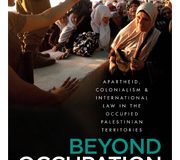Patrick Tyler begins Fortress Israel with an alleged Israeli ‘hit’ against an Iranian nuclear scientist. In reality, the entire book is a ‘hit’, designed to discredit Israel. As with all skilful propagandists, Tyler begins with some truths, but moulds facts and context to suit his case.
Tyler’s thesis has four primary elements. First, that Israel’s defence establishment is reluctant to place its trust in the peace process. This, of course, is entirely appropriate. The Arab states spent decades trying to destroy Israel, many still seek to do so and both the Palestinians and Syrians rejected historic peace proposals. Second, that the defence establishment exerts great influence over the decision-making process and that the civilian leadership is overly dependent on it for policy formulation. True, but this is partly immanent in Israel’s circumstances, the situation was created by the politicians, not power-hungry generals, and a broad recognition of the need to rectify the imbalance, shared by the IDF, has given rise to a number of reforms, including the establishment of the National Security Council.
Third, Tyler claims that he seeks to explain with ‘realism and fairness how the martial impulse in Israeli society and among its ruling elite has undermined opportunities for reconciliation, skewed politics toward an agenda of retribution and revenge and fomented deliberate acts of provocation designed to disrupt international diplomatic efforts… (and) to perpetuate a system of governance where national policy is dominated by the military’. The IDF certainly has great influence, but Israel remains anything but a military society. The IDF is fully subordinate to the civilians and Israel has launched a number of dramatic peace initiatives (e.g. Oslo, Barak at Camp David and his proposal to withdraw from virtually 100% of the Golan, Gaza disengagement, Olmert in 2008).
Fourth, that Israel ‘continues to respond to its founding configuration of threats as if its vulnerabilities had not changed’. Again, he identifies a problem, but fails to note that civilian commissions and IDF reviews have sought to update Israel’s strategy and that much progress has been made. Moreover, this problem is not unique to Israel; ask any student of Western strategy two decades after the Cold War.
The book is written with the craftsmanship of a former New York Timescorrespondent, a title that provided him with unusual access to senior Israeli officials, something they will undoubtedly regret upon reading it, and which is designed to lend legitimacy to what is otherwise an act of thinly veiled enmity. To fully demonstrate his selective and slanted argumentation would require a review many times longer than the book. The following are some examples.
Mischaracterisation. Ben-Gurion, Tyler alleges, opted for war in 1956 to ‘explode’ a US and British attempt ‘to impose a new peace in the Mideast that would require Israel to accept the return of Arab refugees and to give up part of the Negev so as to reconnect the Arab world’. Were this the case, Ben-Gurion would actually have been fully justified, but no mention is made of Egypt’s closure of the straits, nor of the ongoing terrorism. Moshe Dayan is said to have read the Bible obsessively ‘because for him it was a manual for war.’ Really? A manual for war? Ehud Barak, he avers, spoke Hebrew at home ‘like a patriarch … (and) looked at the world as a place where events, if planned and executed with discipline and courage, could change history … His friends called him Napoleon’. As a fluent Hebrew speaker, I have no idea how one speaks it as a patriarch and while Barak is a difficult character (easy-going people do not become Chiefs of Staff and Premiers), he deserves great credit for his dramatic efforts to reach breakthroughs with the Palestinians and Syrians. Avi Dichter, Shin Bet head during the intifada, when Israelis were being slaughtered almost daily, ‘was not interested in understanding the enemy, (he) was interested in defeating the enemy’. Yes, this is the role of security officials; understanding and empathy are best left to therapists.
Gross misstatement. Tyler asserts, absurdly, that Israel’s response to the 2002 ‘Seder massacre’, the most horrific terrorist attack during the intifada, ‘was an invasion the likes of which had not been seen even in the Six-Day War’. Israel’s response, retaking a few Palestinian towns in the West Bank, was a minor operation compared to the conquest of the entire West Bank, Golan Heights and the Sinai Peninsula during the Six Day War.
Lack of balance. Tyler vehemently criticises the defence establishment’s pre-Camp David assessment that Arafat would reject a deal and initiate violence unless Israel withdrew to the 1967 lines, divided Jerusalem and accepted a right of return. In reality, this assessment proved tragically prescient. He devotes virtually no attention to the historic proposals that Barak presented at Camp David and to the even more far-reaching ones he accepted under the Clinton Parameters, both of which Arafat rejected. To substantiate his criticism of Barak, he quotes a junior aide, Gadi Baltianski, who played no role in the negotiations, and Robert Malley, the most junior American involved, but not Clinton and the three leading American negotiators – Dennis Ross, Aaron Miller and Martin Indyk – who blamed Arafat for the failure.
There is disagreement regarding Arafat’s responsibility for the outbreak of the intifada, though there is no doubt that he manipulated it once it erupted. Tyler, however, makes the unsubstantiated assertion that ‘all later reconstructions confirmed’ that Arafat had not initiated it and even charges that the military chiefs’ harsh assessment of Arafat’s role was not supported by their own intelligence officials, only to contradict himself a few pages later by quoting the heads of military intelligence, Malka and Zeevi-Farkash, both of whom fully substantiated it. Tyler also charges that the defence chiefs adopted a ‘blatantly political and propagandist narrative’. His proof – again Baltianski and a mid-level intelligence officer whose assessment had been rejected.
Tyler devotes a lengthy discussion to the 2006 Lebanon war, the prosecution of which can certainly be criticised, and to the attack on Syria’s nuclear reactor, but only a few sentences to Olmert’s dramatic peace proposals in 2008. Forced to acknowledge their existence, he attributes them to malevolent intentions (Olmert’s legal difficulties), whereas Abbas’s dismal failure to respond warrants no criticism. He does not even mention Olmert’s 2006 election platform calling for unilateral withdrawal from 90 per cent of the West Bank.
Gross imbalance. Tyler devotes just one page to Sharon’s Gaza Disengagement Plan, all of it critical, and while one can debate the plan’s merits, it certainly was a dramatic move. Conversely, he devotes an entire section to the killing of Hamas leader Sheik Yassin, who remarkably turns out to have been ‘a profoundly nonviolent man for most of his life’ and who ‘evinced a strong pragmatic streak’, as manifested by his supposed willingness to reach a ceasefire (but not peace) with Israel, in exchange for a complete withdrawal, division of Jerusalem and a return of the refugees, i.e. the maximalist Palestinian position. His killing is described vividly (‘the flash and intense heat seared clothing and flesh’), as is the killing of Ayyash, the mastermind of endless Hamas attacks (‘the explosion killed Ayyash as swiftly and brutally as his bombs had killed more than 50 Israelis and wounded 340’). None of the heinous terrorist attacks for which they bore responsibility are described in such vivid terms and the attempted moral equivalence is repugnant.
Questionable use of sources and conclusions. Tyler states that Rabin ‘was said’ to have ordered the IDF to ‘break their bones’ during the first intifada, but notes that Rabin denied it. So did he say it or not, and if not, why quote it? The killing of Abu Jihad, the head of the PLO’s terrorist wing, is attributed to a desire to revive IDF and public morale and to Israeli martial impulses, not to the fact that he was an arch terrorist. He then claims that ‘a tall female Mossad agent’ filmed the killing – naturally an Israeli femme fatale, sexual innuendo always sells – and that the film ‘was almost certainly screened for Shamir, Rabin and the trusted inner circle’. No sources are given. Regarding a tragic 1996 incident, ‘he writes’ ‘Israeli artillery gunners targeted – mistakenly they said – a UN refugee centre at Kana and slaughtered 100 civilians’. There is no doubt that this was an accident and there was no need to mention it unless the objective was defamation: Anyone know of a military operation in which there have not been errant munitions? The entire operation is explained as a case of Premier Peres ‘simply not (being) strong enough and instead of showing any restraint, he launched the war reflexively – Fortress Israel reverting to type.’ The heinous terrorism that led to the operation is not mentioned and the only ‘reverting to type’ is Tyler’s.
Internal Contradictions. Contrary to Tyler’s argument, the defence establishment is commonly a force for moderation – as he unintentionally demonstrates himself. Tyler states that the IDF led the politicians into a heavy-handed suppression of the first intifada, but notes elsewhere that the chief of staff and head of military intelligence both argued that there was no viable military solution and that a political one was needed. So the IDF was actually fulfilling its duty to protect Israel’s citizens, while adopting a more moderate position than some political leaders.
Regarding the fully justified debate within the defence establishment during the First Gulf War about whether to respond to Saddam’s missile attacks, Tyler argues that ‘to (Defence Minister) Arens and the militarists in Shamir’s cabinet, nothing was as important as Israeli self-reliance. Israel had to defend itself or “deterrence” would collapse’. Yes, these were legitimate concerns and Arens’ wish to attack the SCUDs was eminently understandable. Tyler is forced to acknowledge, but greatly downplays, Chief of Staff Shomron’s highly unusual end run around Arens, going straight to Shamir to vehemently argue against an attack, and the fact that the premier adopted his position. So again, the IDF played a moderating role. Having been forced to give Shamir credit, Tyler alleges that the experience intensified his resistance to peace and the Madrid conference. In fact, the issues were unrelated.
According to Tyler, Rabin’s initial decision to keep the Oslo talks secret from the defence establishment reflected a fear that it might ‘smother the negotiations with security concerns’, but notes on the following page that ‘the reason for his secrecy was self-evident, for as soon as the news broke the opposition took aim at him with venomous attacks’. So it was not a nefarious, anti-peace military that explained Rabin’s behaviour, but politics. Tyler further alleges that the IDF opposed Oslo, but then states that ‘Rabin, wielding his authority, led the army into this new endeavour.’ Once again, it turns out that the politicians, not the IDF, were in charge.
The successful attack on Syria’s nuclear reactor, in Tyler’s words, ‘inspired an even bolder concept among the generals – war on Iran to destroy its evolving nuclear complex’. A few pages earlier, however, he states that the IDF had concluded that a strike on Iran was too large and risky for Israel.
False objectivity. Upon rare occasion Tyler acknowledges that some blame may lie with others. Thus, he allows that ‘Arafat may have been a flawed character’, but avers that he pushed for a political solution as long as he had an Israeli partner. ‘A flawed character’ may be the understatement of the century. Arafat had the blood of thousands on his hands, was a pathological liar and was hated by every Arab leader he ever met. As Clinton, Ross and the other senior Americans involved in the peace process in 2000 have attested, Arafat killed it.
In short, don’t waste your time on this book. I regret that I had to.





































